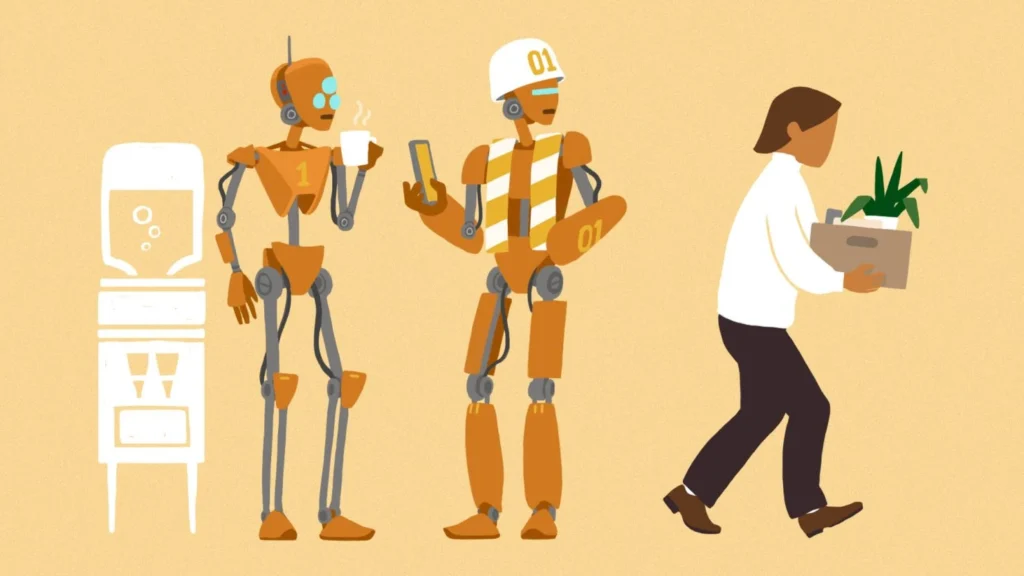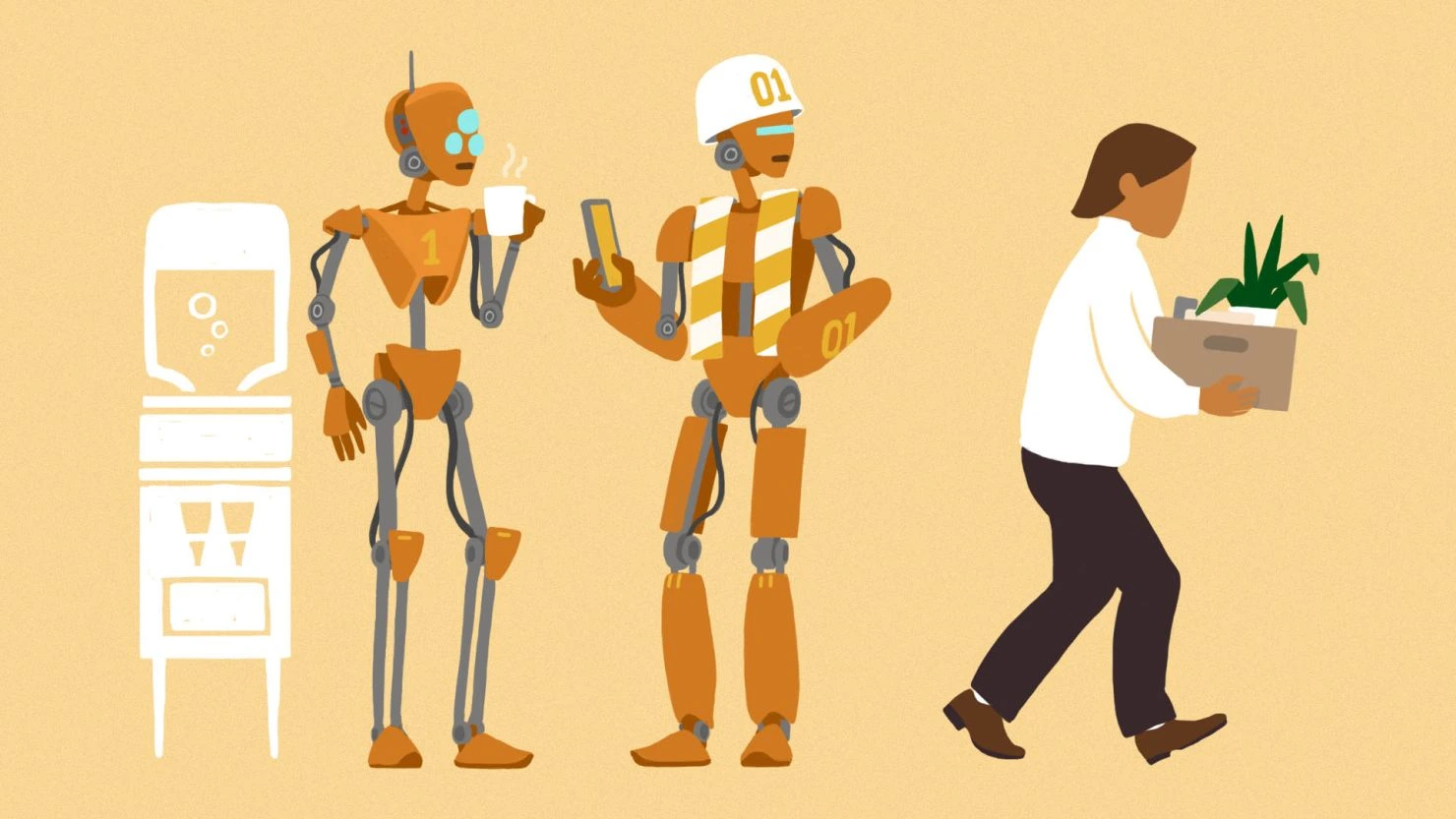Is AI about to cause a white-collar job crisis? Explore expert opinions, real-world examples, and what it means for the future of work.
Table of Contents
Introduction: A Growing Concern in the AI Era
The fear of machines taking over human jobs isn’t new, but artificial intelligence (AI) has brought those concerns to the forefront like never before. With rapid advancements in generative AI, from ChatGPT to Anthropic’s Claude, the possibility of widespread disruption in the workforce feels more real than ever.
In May, Anthropic CEO Dario Amodei warned that AI could drive unemployment among white-collar workers up to 20% in just a few years. Meanwhile, tech giants like Meta, Microsoft, and Salesforce are already using AI to automate coding and other knowledge-based tasks. Even Amazon and JPMorgan have indicated their human workforce may shrink as they adopt AI.
But is a “white-collar jobpocalypse” really around the corner? Or is the narrative exaggerated, fueled by marketing hype and executive strategies? Let’s dive into what experts and tech insiders are saying and explore the potential realities of AI’s impact on the workplace.
The Alarming Predictions: AI as a Job Killer
The idea of AI replacing humans in cognitive roles has taken center stage recently. Amodei’s warning painted a bleak picture, while others like OpenAI CEO Sam Altman have floated ideas such as Universal Basic Income (UBI) to offset the potential loss of income for millions of displaced workers.
Several high-profile companies have begun integrating AI agents capable of performing tasks once handled by teams of professionals:
- Amazon upgraded 30,000 internal applications using AI, saving millions in labor costs.
- Microsoft revealed that AI now generates up to 30% of its code.
- Meta anticipates AI will soon handle half of its code development.
These developments suggest an accelerated shift towards “agentic AI,” systems that don’t just respond to prompts but can execute multi-step tasks independently.
Why Some Experts Say the Panic Is Overblown
Not everyone believes AI is a doomsday machine for jobs. Nvidia CEO Jensen Huang said AI will only kill jobs “if the world runs out of ideas.” Similarly, Google DeepMind CEO Demis Hassabis ranked a potential “jobpocalypse” low on his list of concerns.
Meta’s Chief AI Scientist Yann LeCun argues that most jobs involve a mix of tasks, only some of which can be automated. “Most tasks for most jobs can’t be automated,” he said in a recent LinkedIn post.
Key Points Against Mass Job Loss:
- AI Is Imperfect: High-profile AI failures—like Elon Musk’s Grok chatbot spouting antisemitic tropes—show that relying entirely on AI may be risky.
- Job Augmentation, Not Elimination: Many roles will evolve rather than vanish. For example, doctors may use AI to take notes during visits, freeing them to spend more time with patients.
- New Jobs Will Emerge: Like the Internet revolution, AI could spawn entirely new industries and job categories we can’t yet imagine.
How AI Is Reshaping White-Collar Work Today
AI adoption isn’t just theoretical; it’s already transforming workplaces:
- Customer Service: Companies like Freshworks are moving workers from reactive support roles to more consultative, hands-on client work.
- Education: Tech firms and teacher unions are launching AI training academies to equip workers for the future.
- Software Development: AI tools like GitHub Copilot are changing how code is written, allowing fewer engineers to do more.
But with these shifts comes displacement anxiety. A Pew Research Center survey found that over 50% of Americans worry about AI’s impact on the workplace.
The Challenges of AI in the Workforce
Even if AI doesn’t destroy jobs wholesale, its influence could still negatively impact workers in other ways:
- Wage Pressure: As AI boosts individual productivity, it may lead to an oversupply of labor in certain sectors, driving wages down.
- Corporate Misuse: Companies might cut staff preemptively, citing AI as justification, only to rehire when they realize AI can’t fully replace humans.
- Social Inequality: Without proper policies, the economic benefits of AI could disproportionately flow to tech giants and wealthy investors.
A Call for a New Social Contract
Experts like Gaurab Bansal of Responsible Innovation Labs argue for a “new social contract” that balances technological innovation with worker protection.
Governments and companies are taking some steps:
- The White House has launched initiatives to promote AI education and training.
- OpenAI and others are exploring ways to distribute AI-created wealth more equitably.
But will these measures be enough?
What Does the Future Hold?
The answer likely lies somewhere in the middle:
- Disruption is coming, but not every white-collar job will vanish.
- AI will augment many roles, forcing workers to adapt and acquire new skills.
- Policy and corporate responsibility will play critical roles in determining whether AI becomes a tool for empowerment or a driver of inequality.
In the words of Dan Priest, PwC’s Chief AI Officer: “Net-net, there should be a positive benefit to jobs growth. It’s just going to be different jobs.”
Key Takeaways for Workers and Businesses
- Upskill Now: AI literacy and adaptability will be critical.
- Focus on Creativity and Relationships: These human skills remain hard to automate.
- Advocate for Fair Policies: Workers and policymakers must ensure AI doesn’t exacerbate inequality.
Final Thoughts: Navigating the AI Transition
AI represents both a threat and an opportunity for white-collar workers. The challenge isn’t whether AI will change the job market—it’s how we prepare for that change. By taking proactive steps, both workers and organizations can navigate this transition and emerge stronger.
Related Posts
- Treasury Secretary Bessent Urges Full Review of the Federal Reserve Amid Growing Tensions
- Colbert’s First ‘Late Show’ After CBS Cancellation: Will He Speak Out?
- Starbucks Reveals Pumpkin Spice Latte Return Date for 2024
FAQs About AI and Jobs
Q1: Will AI replace all white-collar jobs?
A: No. AI will likely automate repetitive tasks, but most jobs involve human creativity and judgment that AI can’t replicate.
Q2: Which jobs are most at risk?
A: Data entry, customer support, and basic coding roles face higher risks.
Q3: What new jobs could AI create?
A: AI trainers, ethicists, prompt engineers, and human-AI collaboration specialists are among emerging roles.
Q4: How can workers prepare?
A: Upskilling in areas like data literacy, creativity, and emotional intelligence is key.
Q5: What should businesses do?
A: Invest in AI responsibly, prioritize employee retraining, and avoid over-reliance on automation.

